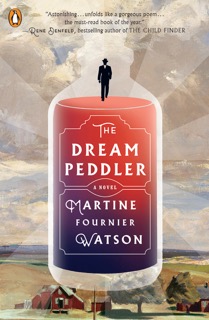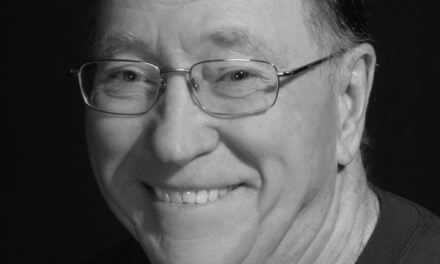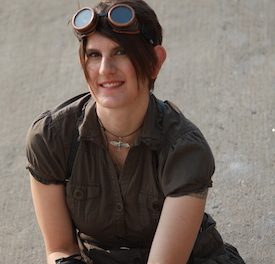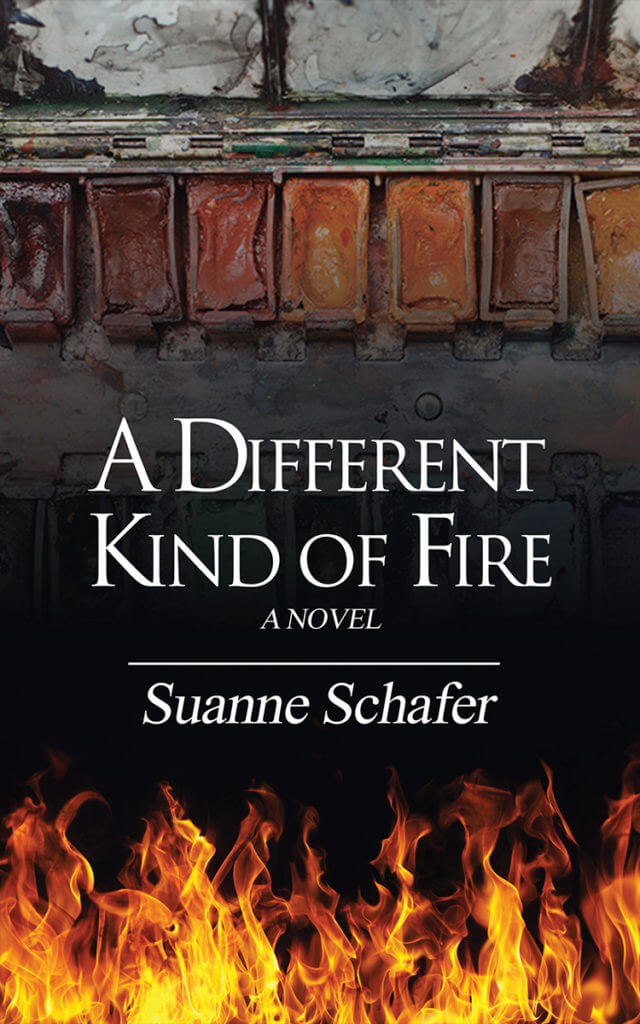Martine Fournier Watson meets with me today to talk about her debut novel, The Dream Peddler. It is historical/literary fiction released April 9, 2018 by Penguin Books. Originally she hails from Montreal, Canada but has been living in the U.S. for fifteen years. Like my ex-husband, she has a master’s degree in art history after spending a year in Chicago as a Fulbright scholar. She currently lives in Michigan with her husband and two children. She was a stay-at-home parent for many years before she decided to start writing again.

SS: Welcome, Martine. Please tell us what your book is about.
MFW: Traveling salesmen like Robert Owens have passed through Evie Dawson’s town before, but none of them offered anything like what he has to sell: dreams, made to order, with satisfaction guaranteed.
Soon after he arrives, the community is shocked by the disappearance of Evie’s young son. The townspeople, shaken by the Dawson family’s tragedy and captivated by Robert’s subversive magic, begin to experiment with his dreams. And Evie, devastated by grief, turns to Robert for a comfort only he can sell her. But the dream peddler’s wares awaken in his customers their most carefully buried desires, and despite all his good intentions, some of them will lead to disaster
SS: Can you share a teaser from your book without giving us a spoiler?
MFW: There was a scuffling just outside the door. Evie’s head snapped to the sound. “Benny?” At once her sluggish veins quickened, as every drop of her went rushing toward that little noise. She ran and pulled the door open and looked out into the snow. Her lantern light glanced off the beady eyes of a startled raccoon. She heard herself screaming at it.
SS: Where did you get the idea?

MFW: I was a huge fan of L. M. Montgomery growing up, and my favorite heroine was Emily of New Moon. Emily wants to be a writer, and in the final book of the trilogy she writes her first novel but is unable to sell it, so she burns it. All the reader ever knows about this book is that it was a modern-day fairytale called A Seller of Dreams. Since I could never know any more than this, my curiosity about the burned book eventually led me to write my own version.
SS: What’s the story behind the title? Who came up with it? Did your publisher change it?
MFW: I really owe the title to L. M. Montgomery as well, but hers felt a little too formal to me, so I tweaked it.
SS: Tell us something we won’t find out by reading the book jacket.
MFW: Despite the book’s title, there are actually only four dreams in The Dream Peddler that are described in any detail. And only two of those are concocted by him.
SS: Tell us about your favorite character.
MFW: This is a tough one! The Dream Peddler has a large cast of characters, and I love all of them. I always have a soft spot for the young people, though, so one of my favorites is eight-year-old Ali McBryde. Although I have to question his morals, I admire his determination and precociousness, and I’m jealous of the fact that he doesn’t have a shy bone in his body.
SS: If you could spend a day with one of your characters, who would it be and what would you do?
MFW: I’m ratting myself out here, but I actually think I could have a really fun day with my old busybody spinster, Violet Burnley. She bakes incessantly, so we’d do that together and then we’d eat cake. She would play her piano, and I’d sing along because I love to sing. She also has a great collection of books!
SS: Are your characters based on real people, or do they come from your imagination?
MFW: It’s a bit of a mixture. Characters come to me already formed, and I get to know them better as I write, so they’re not based on anyone I know. But I often throw in little bits and pieces from real people when I’m rounding them out, either as personality traits or backstory. For instance, Evie Dawson, my protagonist in The Dream Peddler, hates to be laughed at, and that’s modeled on my own mother’s feelings.
SS: How long did you take to write this book from first draft to publication?
MFW: The first draft took about six months, and then I spent maybe another eight months or so getting feedback from beta readers and revising. Finding an agent took a long time! Over eighteen months and a grand total of one hundred and nine queries. Once on submission, it didn’t take dreadfully long to sell—maybe about five months.
SS: What kind of research did you do for this book?
MFW: My research was in two parts. I wanted to know as much as I could about the dreaming process and what kinds of things are possible in terms of influencing our dreams and remembering them. This was fascinating, because I discovered all the things I’d written that felt far-fetched to me are actually quite plausible!
The other branch of the research was understanding farming communities and how they operated during the early part of the twentieth century. Not quite as scintillating, but in order to make the characters and their way of life tangible, I really needed to have all the details, even down to what crops would have been planted or harvested at which time.
SS: What hit the cutting room floor during the editing process?
MFW: Quite a lot! I tend to be a wordy writer, and much of my editing time is spent pruning my prose. The basic plot of the book never changed, but I definitely deleted a few scenes as well. They were originally there to give the reader a little more context and backstory for some of the characters, but in the end they weren’t necessary, and they just weren’t interesting enough.
SS: Are you a plotter or a pantser?
MFW: I am a pantser all the way. The process of discovery is what makes writing so joyous for me. I think if I always knew exactly where my plot was going, I would grow bored.
SS: What is your favorite part of your writing process, and why?
MFW: Definitely the drafting, although it wasn’t always that way. I was in my thirties before someone enlightened me about how first drafts are supposed to stink. Once I started drafting more quickly instead of stewing over every word, it became my favorite part of the process. I love the feeling of a great idea for a scene popping into my head and rushing to get it all down.
SS: What is the most challenging part of your writing process, and why?
MFW: It depends on the book, but editing is always hard for me. Once I’ve written the book, I’m afraid to look at it again, to be overwhelmed by the mess, and I really have to talk myself into it. With my current project, I also did myself the great disservice of writing it out of order as scene ideas popped into my head, having only a vague idea of how they’d fit into the storyline. Organizing that jumble of scenes into a coherent narrative, linking them up with new writing, is the hardest thing I’ve ever done as a writer.
SS: Can you share your writing routine? How do you carve out your writing time? Where do you normally write?
MFW: I don’t have a routine, and I write anywhere and everywhere. I have to keep paper and pen handy everywhere I go! I love best to write outside, usually sitting on our back porch, but if it’s too cold you’ll usually find me on the living room sofa.
SS: Have you ever gotten writer’s block? If yes, how do you overcome it?
MFW: I wish I could be more helpful on this, but writer’s block isn’t something I have experience with. My head is always swimming with ideas. I do get “blocked” in terms of being afraid to sit down and do the editing work, although that’s not really the same thing. And there isn’t any magic cure except to force myself to get started. It’s like a dive into cold water—the anticipation is bad, but once you’re in it’s glorious.
SS: If you could tell your younger writing self anything, what would it be?
MFW: I would tell her that thing about how first drafts are supposed to be terrible.
SS: How many unpublished and half-finished books do you have?
MFW: I have one finished book in the drawer, an awful middle grade novel that I wrote when I was about twenty-five. I realized quite soon after I wrote it that it wasn’t any good, and it also wasn’t worth my time to try to make it better. The premise wasn’t strong enough.
I also have one other literary novel that I abandoned around halfway through. I started it as a NaNoWriMo project, and after discovering that I hate NaNoWriMo, I was so soured on the book that I decided to put it aside. I “won” the challenge, but all I really got out of it was the knowledge that working at that breakneck pace just isn’t for me.
SS: Do you have any writing quirks?
MFW: I don’t know if this counts as a quirk, but I detest typing. I draft everything longhand in notebooks and then transcribe. There’s something about typing that deadens the writing for me—I don’t know how else to describe it. Everything feels more vivid when I’m putting pen to paper and scribbling furiously to try and keep up with my mind.
SS: How did you get into writing?
MFW: I have a very clear memory of writing my first short story in the first grade, and I was pretty much hooked from that point on. I never studied writing formally except for a single poetry class, but I have always made time for it no matter what my job was.
SS: What do you like to do when you’re not writing?
MFW: It’s a pretty typical list of things that introverts enjoy! I love to read, walk on the many trails through the woods around my town, draw and paint. I sometimes stalk writers I admire on Twitter. I also love to travel but don’t get to do that as much as I’d like.
SS: Apart from novel writing, do you do any other kind(s) of writing?
MFW: I write short stories from time to time, but I’ve become a bit lazy about doing the work required to publish them. And for this one year, my debut year, I’m blogging about the whole experience at www.thedebutanteball.com, which is a big time commitment but really fun and completely new for me.
SS: Share something about you most people probably don’t know.
MFW: For many years in high school I was serious about acting and considering it as a career. I wanted to be on stage, and I also sang, so I spent four years training my voice at the McGill Royal Conservatory in Montreal to that end.
SS: Which books influenced you the most?

MFW: I’m not sure I can narrow it down to just one, but certainly one of my all-time favorite books is one that I happened to be reading around the time I was writing The Dream Peddler, The Story of Edgar Sawtelle by David Wroblewski. His writing is everything I could hope mine to be, and his agent was one of the first I queried. I also read everything by Donna Tartt—she is brilliant.

SS: I’ve read both of those. I particularly enjoyed Edgar Sawtelle. Martine, what are you working on right now?
MFW: I recently finished a readable draft of my second book, so I’m waiting to get feedback from a few kind writers who have agreed to critique for me. It’s another adult literary effort, this time about two eighth-graders who become friends without realizing that one of them has found something precious the other recently lost.
SS: What’s your favorite writing advice?
MFW: Ignore all the advice and trust your instincts.
SS: What book are you currently reading?

MFW: Right now I’m reading The Dreamers by Karen Thompson Walker and loving it! I wanted to read it because it’s about a small town overtaken by a mysterious sleeping sickness that seems to cause powerful dreams, and I was curious about what it might have in common with my own book. I’m so glad I discovered it, because the writing is beautiful and the story completely absorbing.
********************
A mysterious peddler claiming to sell bottled dreams arrives in a small town rocked by a child’s disappearance, and his dreams awaken the long-buried desires of the townspeople. BLURB

“Astonishing . . . The Dream Peddler unfolds like a gorgeous poem, leading us deep into the lives of its characters, and exploring the vast underground legacy of our own desires. This is the must-read book of the year.” —Rene Denfeld, bestselling author of The Child Finder.
“Fournier Watson’s tale is gorgeous and carefully paced, with subtle tensions among the townspeople and lush descriptions of the natural world. Themes of coming and going, holding on and letting go, permeate this highly engaging, captivating, and, yes, dream-infused story.” —Kirkus Reviews
The Dream Peddler is available through:
********************
Martine Fournier Watson can be found here on social media:












